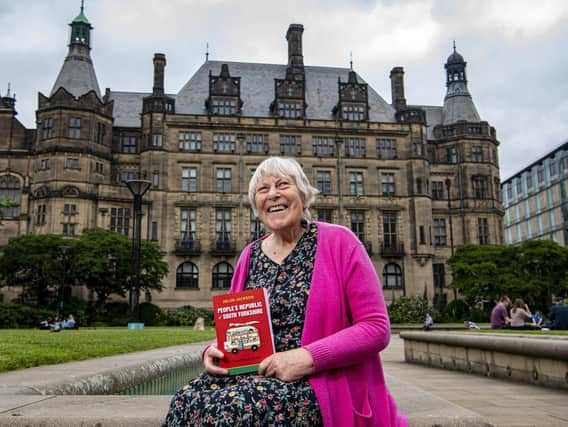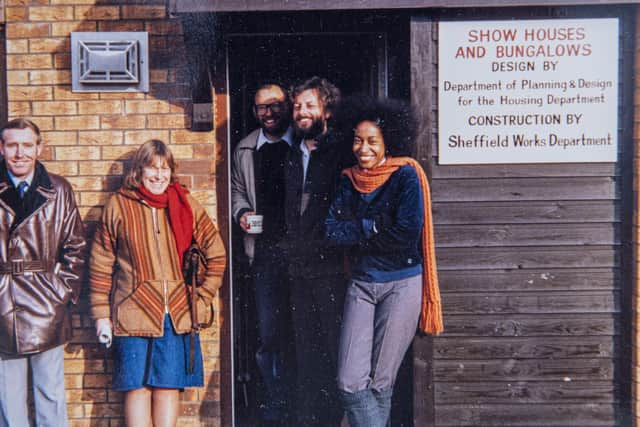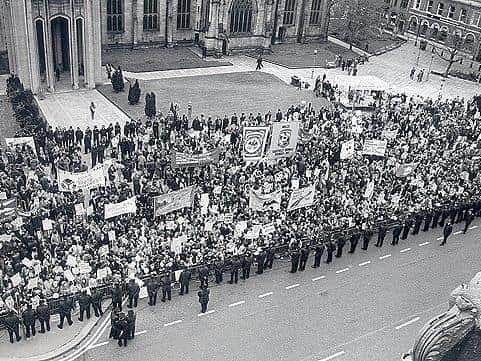Egg-throwing at Margaret Thatcher, 10p bus fares and battles with sexism - inside the 'People's Republic of South Yorkshire'


The ‘People’s Republic of South Yorkshire’ was a nickname used as much by detractors of the region’s left-wing administrations in the 1980s as their supporters but for Helen Jackson it is a phrase that provokes a simple feeling: pride. So much so that it is the title of the 82-year-old’s very first book.
Jackson was Labour MP for Sheffield Hillsborough for 13 years between 1992 and 2005 but her political memoir focuses on her formative years on Sheffield Council where she played a central role in the council’s left-wing administration led by a young David Blunkett and its bitter battles with Margaret Thatcher’s Government.
Advertisement
Hide AdAdvertisement
Hide AdMeeting at a cafe around the corner from Sheffield Town Hall, Jackson explains she wanted to give an insider’s account of a fascinating period of the city’s political history.


“I felt there was something a bit remarkable about the 1970s and early 1980s in Sheffield which was picked up in London and recognised a different way of economic development,” she says.
“I’m as proud of that as much of anything else I have done. What we were showing was how you could actually deliver a change and it actually worked.”
One of the most symbolic policies of that era were the subsidised bus fares that were introduced by the Labour-controlled South Yorkshire County Council in the 1970s which were set at a 10p flat rate for adults, 2p for children and free for pensioners. In her book, Jackson says the policy helped Sheffield become one of the least congested cities in the country and particularly helped women, many of whom at the time did not hold driving licences let alone own a car.
Advertisement
Hide AdAdvertisement
Hide Ad“It was a symbol of confidence and bloody mindedness because in all those early years we never had the backing of the Labour Cabinet,” says Jackson. “They constantly tried to persuade us to drop it. It was bloody popular and people still remember. It was South Yorkshire-wide and that is why it worked, it brought together that wider labour market in economic terms.”


The book is also a reflection on Jackson’s growing feminism as she frequently faced sexism as a woman in a male-dominated political environment.
She said the five-year process of writing the book had helped her reflect fully for the first time on “the degree to which I had changed and learnt and became different in my personality and particularly views”.
Jackson joined the Labour Party in 1962 after becoming involved in the Association for the Improvement of Maternity Services following a difficult birth.
Advertisement
Hide AdAdvertisement
Hide Ad"After I had my first child I was very disappointed by the way the hospital delivery was managed. I thought I suppose I had better join the Labour party so I did,” she explains.


After moving to Sheffield in 1974 with her husband and their three young children, she became involved in local Labour politics in addition to working as a teacher. The bus fares policy played a major part in Jackson’s move into frontline politics as she was asked to speak about its benefits at the Labour Party conference in 1978 at a time when the national leadership was opposed to it.
She recounted how the cheap bus fares enabled her to take her three children around South Yorkshire, helped young people learn independence and enabled pensioners to visit family members for free. She writes: “Long afterwards I realised that I had spoken with conviction, because I was using my experience as a woman with a family to win the argument. That had given me confidence. I have never forgotten how this one challenge made such a difference to me, a woman, away from her children for the first time doing something she had never done before.”
The experience gave her the confidence to stand for the council and she was elected to represent Owlerton in 1980. After little more than a year as a councillor, Blunkett asked Jackson to take over as chair of the Works Committee, a post in which she spent two years in the even more male-dominated environment of construction.
Advertisement
Hide AdAdvertisement
Hide AdIn the book, Jackson recounts how she “had to put older managers at their ease by asking about their families in a way they saw as normal conversation with a woman, before I could establish a useful discussion about the best way of achieving high productivity in a maintenance contract”.


She says today the experience ended up being a good grounding for her next post running the Employment Committee.
“It was in the early 1980s and it was the building trade. I always felt because people who had become managers through the craft system had never had at that level colleagues who were female to work with. They felt awkward. I don’t want to be negative about it because once they relaxed it was fine but you had to get to that situation before you could make proper contact. It was one of those little things you learn.
“It was a sharp learning curve in the Works Department. You become more self-aware and it becomes much easier to deal with. When we were dealing with people from the Chamber of Commerce and I was chair of economic development it wasn’t the same problem but you could tell it was still there.”
Advertisement
Hide AdAdvertisement
Hide AdThere was one woman Jackson had little time for – Margaret Thatcher. She was among the hundreds who protested against Thatcher when she came to give a speech to businessmen in the city in 1983 and had an egg thrown at her. “I was outside the Cutlers’ Hall, shouting. I never threw an egg, though – nearly did.”
The Miners’ Strike soon followed as Thatcher took on the trade unions and Jackson’s book is critical of Arthur Scargill’s leadership of the NUM. “Arthur Scargill’s rhetoric and character made it easier for Thatcher to treat the issue not as an industrial dispute within the energy sector but as a war,” she writes.
Jackson is initially reluctant to talk any further about Scargill but does say the experience of the time made her reassess some of her political opinions.
“There was something that grated - it was partly to do with the tone of voice and being so sort of shouty and cocky. I know exactly the same characteristics were being displayed by Margaret Thatcher at the same time. There were great similarities I think between Margaret Thatcher and Arthur Scargill. He wouldn’t like that but there were. They had to be in the forefront.”
Advertisement
Hide AdAdvertisement
Hide AdShe agrees that it was hard for those supportive of the miners but concerned about his approach to speak out at the time.
“That has been well documented, it was. You couldn’t because the strike was on and kids needed feeding. The women were holding the whole thing together in those communities. It was so important, they held the whole movement together. It was never properly recognised that was happening.”
In 1986, South Yorkshire County Council and several other metropolitan authorities were abolished by the Government, while a Transport Act ended South Yorkshire’s cheap bus fares by making public subsidies illegal.
Peter Sephton, chief executive of the South Yorkshire Passenger Transport Executive, lamented the change. He said: “Some still regard South Yorkshire’s transport as the aspirations of the ‘loony left’. These people generally live outside the area. Of those who experience these trials and tribulations at first hand, hardly anyone will criticise the underlying aim - a higher quality of life through a higher quality of public transport.”
Advertisement
Hide AdAdvertisement
Hide AdJackson says: “The bus fares went up three-fold overnight as a result. After the Miners’ Strike, there was a sort of direct dislike and hatred of local autonomy by Thatcher. The rate capping and the removal of local powers over finance were dramatic and have never been restored. Local Government is not what it used to be. We couldn’t have done what we did in the 1980s without that sort of degree of autonomy.”
Intriguingly there have been recent moves to bring buses under public control once again in South Yorkshire.
After Andy Burnham announced in March that Transport for Greater Manchester would start controlling local bus services on behalf of the Greater Manchester Combined Authority – bringing them under local authority control for the first time since deregulation in the 1980s - Labour leaders in South Yorkshire said they were considering a similar move.
Jackson praises Burnham as a “good man” and says she is encouraged but cautious about the efforts to do something similar in South Yorkshire.
Advertisement
Hide AdAdvertisement
Hide Ad“I have participated in a couple of webinars about it. They are very much along the right lines but whether their position on franchising will hit the right buttons in terms of pricing I don’t know. The pricing is absolutely key to the popularity.”
In 1992, Jackson was chosen as the Labour candidate for the Sheffield Hillsborough constituency, but not without a considerable fight. She recalls in the book that when she mentioned she was considering putting her name forward to a group of younger male councillors she was met with a “shocked silence”.
“‘Why ever not?’, I kept thinking. Then of course I realised it was because I was a woman,” she writes.
She reflects today: “That certainly was a pivotal moment in my life. It was an awakening with a certain amount of anger. I was listening to these youngsters talking about how they were going to be the next MP. I thought, what? I’ve been the chair of the committee, not them. I’m not easily angry but it was pivotal.”
Advertisement
Hide AdAdvertisement
Hide AdAfter narrowly winning the vote to be the candidate she comfortably won the seat and went on to be area’s MP for 13 years. The likes of Jackson, Blunkett and Clive Betts who had been central to the ‘People’s Republic of South Yorkshire’ in the left-wing Sheffield Council went on to be part of Tony Blair’s much more centrist New Labour
While the book makes little mention of her time in Parliament, it does describe what she says today is her proudest political achievement – playing a part in the Good Friday Agreement in 1997 as the Parliamentary Private Secretary to Mo Mowlam.
She says both her understanding of the importance of having female voices around the political table and her understanding of the importance of local issues from her time at Sheffield Council stood her in good stead for the role. They helped support the founding of the Northern Ireland Women’s Commission to give women a voice in the discussions.
“Mo Mowlam said very wisely we cannot do this unless we have the support of the women in Northern Ireland. Her problem was there were very few women in the political structures and still aren’t. It is interesting what is happening at the moment to Arlene Foster She was so dead right about that.
Advertisement
Hide AdAdvertisement
Hide Ad“It was that and through I suppose the sort of local Government approach that recognised the importance of community leaders and the role of localism and communities. That was a very useful experience to be honest.”
Jackson is more reticent when it comes to her thoughts on Labour’s direction nationally and locally in more recent times.
The party has struggled in the polls under the very different leadership styles of Jeremy Corbyn and Sir Keir Starmer, while the Labour group on Sheffield Council recently lost overall control of the local authority and is now in a power-sharing agreement alongside the Greens who have benefited from public anger at the handling of the city’s mass tree-felling debacle.
Jackson measures her words carefully when I ask her what she thinks of recent developments, which has also seen Sheffield voters back a new committee-style of local government instead of the ‘strong leader’ model used by Labour in recent years.
Advertisement
Hide AdAdvertisement
Hide Ad“I’m not part of all that. I’m a detached aged person but I do think it is no bad thing they are working together with the Greens and we will see how it goes. I think things are evolving,” she says.
When I press on the matter, she adds: “I’m glad they are working together with the Greens. This is a general point but I don’t like saying negative things.”
In terms of her own personal politics these days, she says: “I don’t like ‘isms’, I just don’t. I don’t like lazy labels. Some of the most useful things I have done since have been on a cross-party basis but I’m still a member of the Labour party.”
Jackson received a CBE in 2010 for her work in South Yorkshire and on the Women and Pensions Network, while she remains an active member of the Women’s Budget Group, an independent organisation that monitors the gender impact of Government policies.
Advertisement
Hide AdAdvertisement
Hide Ad“A lot has come out of the pandemic. There has been a lot of lip service paid by men about the degree to which they share in childcare and care of the elderly. That is why I’m still an active member of the Women’s Budget Group because there still needs to be a significant shift in all countries.
“We developed a phrase when I was organising the Women’s and Pensions Lobby after I had stepped down from Parliament – ‘If it is right for women, it will be right for everyone’. It is as simple as that. It goes back to the bus fares, really. If the main beneficiaries are women, it is probably a good thing. There is still a lot of change required.”
Launch event planned for new book
A launch event for Helen Jackson’s book will take place at the Peace Gardens in Sheffield on Friday June 25 at noon.
Jackson says she greatly enjoyed writing the book, which came about after she gave a talk about her political career to students at her former college at Oxford University and was told she should write a memoir.
Advertisement
Hide AdAdvertisement
Hide Ad“It was difficult to stop because I found it so interesting and did a lot of it meeting people and interviewing them,” she says.
“I was continually thinking, ‘I know who I should talk to’. It took a lot of willpower to decide to finish it and start looking for publishers. I had to squeeze the whole thing down – it must have been twice as long at first.”
People's Republic of South Yorkshire by Helen Jackson is published by Spokesman and is out now.
Support The Yorkshire Post and become a subscriber today. Your subscription will help us to continue to bring quality news to the people of Yorkshire. In return, you'll see fewer ads on site, get free access to our app and receive exclusive members-only offers. Click here to subscribe.